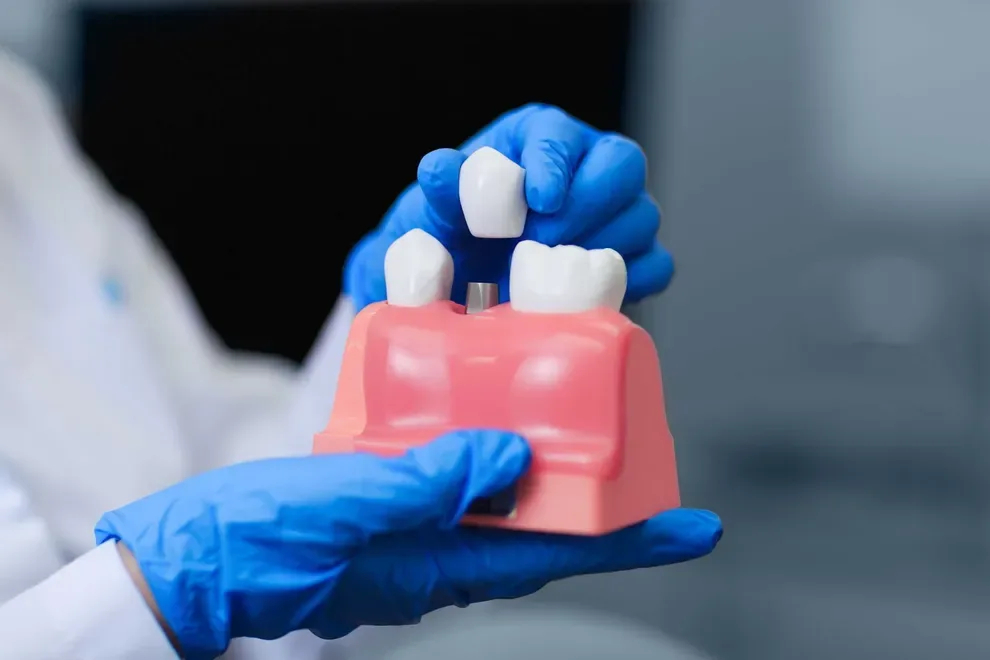Mini-Dental Implants: Uses, Costs & Effectiveness

Table of Contents
- What Are Mini Dental Implants?
- How Are They Different from Traditional Implants?
- Costs
- Effectiveness
- Proper Care
Mini dental implants are smaller than traditional implants. They can be placed through less invasive techniques.
Approximately 178 million Americans are missing at least one tooth. The first choice of treatment for missing teeth is often a dental implant.1 Dental implants replace the missing tooth with an artificial tooth that is grafted into the bone.
Due to their smaller size, mini dental implants cost less than half of what traditional dental implants cost. The mini implants are considered highly effective for holding dentures in place. They are used as a solid alternative to standard implants.
Caring for mini dental implants involves practicing good oral hygiene.
What Are Mini Dental Implants?
Mini dental implants are similar to traditional dental implants except they are smaller.
Mini implants range from 1.8 mm to 3.0 mm in diameter. They were initially used in place of traditional implants when there was not enough bone structure or gum tissue present.
Mini implants are regularly used to support dentures and orthodontia. They are also used to replace lost teeth in place of traditional dental implants.
Implants can be placed as a standalone artificial tooth or to support a dental prosthesis that fills bigger gaps or replaces more teeth at a time. Dental implants can help to keep the rest of your teeth from moving. They also improve your ability to eat and talk, and boost your desire to smile.
How Mini Dental Implants Differ From Traditional Implants
A traditional implant requires a surgical procedure to fuse an artificial tooth to the bone through a process called osteointegration.2 Dental implants are often made of a metal-like titanium that the body will integrate as part of itself. Overall, success rates for dental implant surgery to replace missing or lost teeth are very high.
Mini dental implants differ from traditional implants in that they are smaller, but they also require a less invasive procedure to place. Mini implants are secured to the bone by one piece instead of two; therefore, they require less bone material for fusing.
Since mini dental implants are about half the size of a traditional dental implant, two mini implants may be required in place of one traditional implant.
Costs for Mini Dental Implants
Dental implants are a highly successful option for replacing missing teeth, but they are also very costly. Mini dental implants cost less than half of traditional dental implants on average. Prices range from $500 to $1,500 per implant, as opposed to $4,000 to $5,000 just for the implant.
If you have lost a tooth due to trauma, injury, tooth decay, or any other reason, it’s best to have something put in its place to act as a placeholder (at the very least). It’s ideal to have something placed that helps you eat and talk more normally.
Insurance will often cover at least part of the cost of an implant surgery. This is often deemed a medically necessary procedure.
Dental insurance providers regularly have a cap on how much they will pay. Usually, you will be responsible for a percentage of the procedure at the very least.
Mini dental implants can offer a more affordable option than traditional dental implants, costing you less out of pocket.
Effectiveness of Mini Options
Mini dental implants can be used effectively when standard implants are not an option. They may help to hold dentures in place, to replace a single tooth, for dental bridge repair, and for orthodontic anchorage. They are shown to be successful through a less invasive procedure to place them.3
There are many benefits of mini dental implants.
They are more cost effective than traditional implants.
They can be placed when there is not enough bone or gum tissue for a traditional dental implant.
They require a less invasive surgery and therefore a faster recovery time.
Fewer dental visits are required.
Proper Care
One of the advantages of mini dental implants is that they can generally be placed in one dental visit, instead of multiple. Since the procedure is less invasive, the recovery and healing time will also be shorter than if a traditional dental implant is placed.
A mini dental implant is integrated into your mouth like a natural tooth. After the recovery period, it will need to be cared for in the same way as your other teeth.
Caring for your mini dental implant includes practicing good oral hygiene as follows:4
Brush your teeth, including the mini dental implant, at least two times per day with a soft-bristled toothbrush and fluoride toothpaste for two minutes each time.
Floss in between your teeth once every day.
Eat a balanced and nutritious diet.
Limit snacking and sugary food and drinks.
Stay away from tobacco products.
Visit your dentist regularly for routine checkups and professional cleaning.
Talk to your dentist about use of a fluoride mouthwash or other dental products.
Talk to your dentist about how best to care for your mini dental implant and how often you will need to schedule routine dental care appointments. Typically, you will need to visit the dentist once every six months, although this can vary based on your oral health needs.
